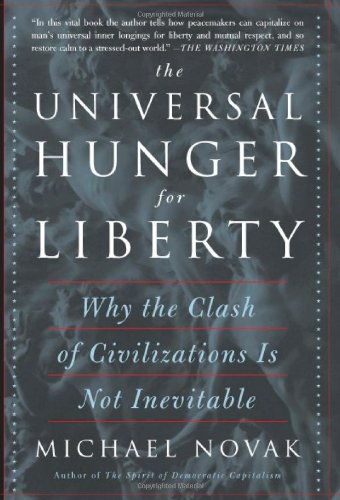Customer Services
Copyright © 2025 Desertcart Holdings Limited
Desert Online General Trading LLC
Dubai, United Arab Emirates


The Universal Hunger for Liberty: Why the Clash of Civilizations Is Not Inevitable
L**R
Idealism by reason
'Who's the intended reader of my book', authors may ask themselves. Surely Ambassador Novak has the well-informed, semi-religious American reader in mind as his "audience of one". When suddenly a culturally secularised, European reader comes across Novak's book, a slight confusion may appear: Since when did we write Creator and Love with capital letters? Are we supposed to accept Novak's premise that there is, indeed, such a Creator? Europeans may not, yet strangely, one gets used to it. Which explains, in part, why Novak is succesful in his attempt at furthering the case for idealism by reason. For this is his Utopia; Reason (capitalised in my interpretation) is the path through which acceptance among civilastions may come about. And to agree with Novak, one does not need to accept the premise of an omnipotent and omnipresent Creator. One does only have to accept that this is accepted by the vaster number of people world-wide.And so he sets out by declaring himself as a utopian (his name being Caritapolis, as in the greek for Love and City) before arguing that there is an element of reason inherent in all religions (particularly the three religions of the Book - Judaism, Islam and Christianity). And reason, as it were, provides sufficient material to advance a theory of capital and of prices, rather like economist and philosopher F. A. Hayek would have done. Thus we need to accept capitalism and the rule of law as core elements of our dialogue between cultures. This is where Novak is particulary succinct and compelling and he argues his case with the acumen of a financier and the moral flavour of an evangelist.What is crucial to Novak is theology's role in defining the core elements of what rationality may mean within different cultures and religions. It is thus the dynamic relationship between various religions and their theologies and ultimate ends, and developments of politics and ecenomoics within these cultures, that could prove the core bulding blocks of a new rational "conversaton" which has as its objective peace and prosperity for all.Novak, therefore, is an idealist trying to cope with the harsh realities of religions and realpolitik. He succeeds to a point, in setting out a framework for cooperation. And if you accept that capitalism is a rational means towards prosperity, and that public morality must be based upon religious ethics because religion is such a central reality for most people on the globe, you may very well come to believe in idealism by reason.Read the book, then. And if nothing else compels you, a bit of idealism and optimism could be a welcome change from everyday politics ...
Trustpilot
2 weeks ago
1 month ago